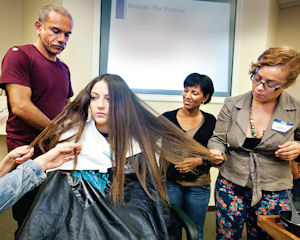Zerran International Corp. wants the world to get it straight — its hair, that is — and the economic signs seem to be saluting. The Pacoima company invents and manufactures vegan formaldehyde-free smoothing and re-texturizing hair products, which are sold only to salons and industry professionals. By all accounts its signature hair straightening product, RealLisse, made a splash last month in Brazil with its introduction to the South American market. Cindy Van Steelandt, Zerran’s co-owner and director of marketing, said Zerran’s hair care treatments and products also have taken off in Europe, North Africa and Scandinavia. In July, the company boosted its Swedish operations with a new distributor in Stockholm. “We’ve had a gigantic increase in international sales,” said Van Steelandt in a July 25 interview upon her return from a trade show in Las Vegas, where Zerran unveiled a new marketing campaign aimed at streamlining distribution. The central concept is to present its products in functional hair care categories through nine product lines: Volumizing, Active, Shine, Smoothing, Repair, High Styling, Advanced Professional Services, Hair Revival and California Classic. This has been an undeniably big year for Zerran. In April, it relocated to a 200,000-square-foot headquarters, more than doubling its space with new offices, a manufacturing and distribution center and onsite research and development facilities. That facilitated Zerran’s July launch of its newest salon product, APS Resistance Protective Crème, a vegan formula that protects the scalp and skin during chemical processes. Perhaps more significantly, the company in July began distributing RealLisse in Brazil through a new company, Zerran Brasil, with an initial focus on the country’s two largest markets, Rio de Janeiro and Sao Paulo. Zerran Brasil principals Jose Figueiredo, Felipe Rechtman and Rony Rechtman recently visited the Pacoima headquarters to discuss trends and Zerran products under development. Formaldehyde-free products Brazil may indeed be the enchanted land for Zerran. While the professional salon hair care market in Brazil comprises 4 percent of the global market, the country regularly ranks in the top three worldwide in terms of consumer value, increasing at a faster rate than the United States or Europe. In 2010, Euromonitor reported that Brazilians spent nearly $8 billion on toiletries, perfumes and cosmetics, second only to the United States. In a mix of uncanny strategic planning and a dose of good fortune, Zerran initially brought RealLisse to market in January 2011, just three months before federal officials announced that ingredients in the company’s then main competitor — Brazilian Blowout, a hair straightener made by GIB LLC of North Hollywood — created health risks for salon workers and customers. That spurred a global controversy and led to government-imposed product bans in Europe and Brazil. After agreeing earlier this year to issue consumer safety warnings and pay $4.5 million in a class-action settlement and a $600,000 fine to the California Attorney General’s Office, GIB’s product remains available in the United States. The key difference between RealLisse and a typical Brazilian keratin system is that the latter uses formaldehyde to bond animal proteins to hair, while RealLisse uses a special high-heat iron — one that stays at 450 degrees, hotter than most models — to bond vegetable proteins to hair. Since the launch of RealLisse a year-and-a-half ago, Zerran’s sales have increased 40 percent. In 2010, Zerran’s sales were limited to the domestic market, but last year foreign sales comprised 23 percent of its revenue, a figure its executives expect to continue climbing. RealLisse has been “a spectacular success,” said Mike Nave, president and publisher of the Beauty Industry Report, a trade publication based in Calabasas. “When (RealLisse) hit the market, it was an answer from heaven for the salon industry.” The industry had come to rely on huge income it had consistently reaped from Brazilian Blowout and similar products. “The profit margins were enormous,” Nave said. The ban, however, changed all that. While formaldehyde-based keratin hair straightening products have not been banned in the United States, consumer safety concerns and overseas bans threatened the viability of the hair straightening market until RealLisse came along, Nave said. Particularly during lean economic times, he said, Zerran’s product “literally kept some salons in business.” Growth opportunity The genesis of RealLisse dates back to 2005, when Zerran was selling shampoos, conditioners and styling products in Brazil, as well as developing products for other companies. A salon supplier in Sao Paolo asked Zerran to develop a formaldehyde-free hair straightener. Van Steelandt said Zerran’s R&D team enjoyed and embraced its mission to create RealLisse, a product that became “an utter and absolute game changer.” How did they come up with such a radical concept: natural ingredients applied through a super-heat process to safely straighten hair? “Don’t ask me,” she said with a laugh. “I just turned them loose on it. Our guys think so far outside the box that they don’t even know where the box is.” Nave of Beauty Industry Report called Zerran, which was formed in 1987, a “well run company,” noting that its domestic sales have also done well. The bottom line, he said, is that women want a means to safely change the texture of their hair. “This (product) category is absolutely growing,” he said. “It’s definitely not going away.” Industry figures seem to reflect that. According to the most recent “Professional Salon Industry Haircare Study,” released by Professional Consultants & Resources (PCR), a leading salon industry strategic consultant and data supplier based in Texas, U.S. salon revenues in 2011 for straightening/smoothing services, along with cutting, styling and hair color, increased 3 to 4.5 percent. Cyrus Bulsara, PCR president, noted that the hair straightening market grew “exponentially and at a very robust rate” between 2006 and 2010. Although market growth declined in 2011 after the Brazilian Blowout controversy, he predicted it would rebound because of “new genres of products” currently being introduced by larger and more organized companies that already had products in R&D pipelines.
